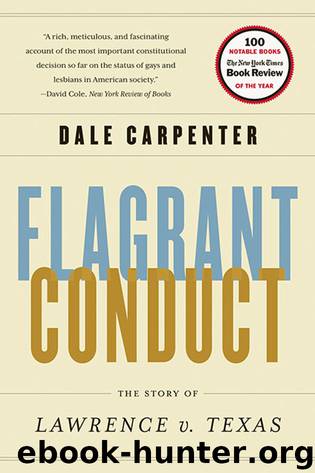Flagrant Conduct by Dale Carpenter

Author:Dale Carpenter
Language: eng
Format: epub
Publisher: W. W. Norton & Company
Published: 2012-02-09T16:00:00+00:00
15.
Mismatch at the Supreme Court
A CHASM OF WORLDVIEW AND APPELLATE EXPERIENCE SEPARATED the lawyers who squared off over the constitutionality of the Texas sodomy law on March 26, 2003. That was no accident. For each side, the process of choosing the oral advocate mirrored the brief-writing process. For Lambda, the decision was calculated, methodical, extensively discussed, a product of consultation, and designed to maximize the chances of success. For the Harris County D.A.’s office, the process was haphazard, idiosyncratic, insular, and unreflective.
There was no shortage of excellent candidates to argue against the constitutionality of the Texas sodomy law. One obvious choice would have been Professor Laurence Tribe of Harvard Law School. Extremely intelligent and knowledgeable, with a gift for words and remarkable intellectual agility even by the high standards of appellate advocacy, Tribe had written the best-known modern treatise on constitutional law.1 He was considered a leading authority in the area and had argued many cases before the Supreme Court.
Tribe’s work on Bowers v. Hardwick had given him an immediate facility with the underlying doctrinal controversies. But reviews of his performance in that case were mixed. While gay-rights advocates had been ebullient immediately after the oral argument,2 they were ultimately disappointed. Justice Lewis F. Powell Jr., the swing vote in the case, panned Tribe’s “usual overblown rhetoric” but did concede that he had focused narrowly on the precise issue of state power before the Court.3 A former clerk for Justice White, who wrote the opinion upholding the Georgia sodomy law, was even more critical. “Tribe blew his oral argument,” opined Andrew Schultz. “He was flailing from the very beginning.”4
Unlike his successors in the Lawrence litigation, Tribe did not draw attention in his oral argument to the tremendous changes in the country that had already occurred since the early 1960s, like the removal of homosexuality from the list of mental disorders by the American Psychiatric Association in 1973. He also failed to articulate clearly what Powell needed in order to side with Hardwick: “a limiting principle” that would allow states to continue to criminalize incest, bigamy, and bestiality—the very “slippery slope” fears the Lawrence team would be so well prepared to swat away.5
To be fair, it’s not clear that the most silver-tongued orator or dazzling constitutional lawyer could have persuaded the Court to overturn the Georgia law in 1986. It was a little too soon. The Court and its members needed more time and experience with actual, known gay people before they could associate homosexuality with families and appreciate the importance of intimacy for gay couples and individuals.
Tribe approached the Lawrence team, asking to handle the oral argument.6 He believed deeply in the cause. He was obviously experienced. A second chance would allow him some personal redemption. However, gay-rights advocates in the Lawrence litigation were not enthusiastic about having Tribe take the baton again. He had not been involved in the case up to that point. A few doubted his ability to take it on and do it well. Much had changed since 1986, both on the Court and in the field of gay-rights advocacy.
Download
This site does not store any files on its server. We only index and link to content provided by other sites. Please contact the content providers to delete copyright contents if any and email us, we'll remove relevant links or contents immediately.
| Africa | Americas |
| Arctic & Antarctica | Asia |
| Australia & Oceania | Europe |
| Middle East | Russia |
| United States | World |
| Ancient Civilizations | Military |
| Historical Study & Educational Resources |
The Body: A Guide for Occupants by Bill Bryson(5082)
Liar's Poker by Michael Lewis(3441)
Into Thin Air by Jon Krakauer(3385)
Tuesdays With Morrie by Mitch Albom(2754)
Into the Wild by Jon Krakauer(2628)
The Diamond Cutter by Geshe Michael Roach(2058)
My Dark Places by James Ellroy(1926)
Columbine by Dave Cullen(1863)
Helter Skelter: The True Story of the Manson Murders by Vincent Bugliosi & Curt Gentry(1719)
Extraordinary, Ordinary People by Condoleezza Rice(1495)
Everything in Its Place by Oliver Sacks(1482)
Pilgrim at Tinker Creek by Annie Dillard(1428)
Into the wild by Jon Krakauer(1425)
You Can't Touch My Hair by Phoebe Robinson(1401)
The Girls: Sappho Goes to Hollywood by Diana McLellan(1317)
Dark Towers by David Enrich(1251)
Betrayal by Gregg Olsen(1245)
Call Sign Chaos by Jim Mattis & Bing West(1223)
Remedy and Reaction by Paul Starr(1195)
